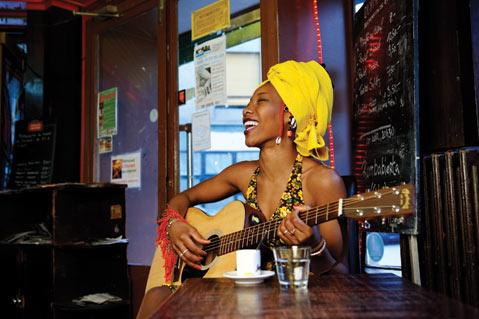Fatoumata Diawara Is Finding Freedom in Music
The Malian Singer Headlines UCSB’s Campbell Hall

It’s been a while since Fatoumata Diawara has done any significant work as an actress, but that doesn’t mean people have stopped asking her about it.
“People don’t often know much about what I did as an actress, so when they ask me about that, I just say ‘I am an artist,’” she laughs. “I just like to express myself, through painting, by dancing, writing songs, composing songs, acting. For me, it’s the same. It’s for the soul, you know?”
Diawara’s story is as inspiring as it is fascinating. Born on the Ivory Coast to Malian parents, she has always been fiercely independent. Her first significant role onstage was Antigone (fittingly) in Paris, but it was her performance in 2001’s Sia, The Dream of the Python that made Diawara a beloved figure in her home region. It also made her a highly sought-after actress.
An unmarried woman is considered a minor in Mali, though, and Diawara was quickly forced to retire from acting by her family, who decided it was time for her to settle into an arranged marriage. Spurred by an offer from Jean-Louis Courcoult (director of the renowned French theatre company Royal de Luxe), Diawara fled Mali at the age of 20. She ended up in Paris, where she has lived ever since.
Diawara’s singing career began in Parisian nightclubs, where she performed songs she wrote at home, or backstage during tours with the Royal de Luxe. But years down the line, a conversation with Malian musician Cheick Tidiane Seck would bring Diawara back to Mali, a trip that she says ignited her true passions for music and for people.
We recently had a chance to talk with Diawara about her life as an artist and musician, her thoughts on European intervention in her home country, and whether she’s gotten used to singing onstage.
Has performing as a musician, rather than as an actress, gotten any easier with time? It’s always difficult, but every time, it’s funny. It’s like my base place — I feel more comfortable onstage than in life sometimes. It’s strange, because I am very sensitive, but the stage has become where I decompress — where I stretch myself, my body, and my soul.
The difficult part is, because it’s live, you can never know what is going to happen, even if you’ve played a song a million times. It [feels] like the first time every time, with the same intensity. The risks that you take are the same every time. That is also what makes it nice, though, because every day, every time, it’s new. I love that. It’s like emancipation. Freedom.
Are you enjoying writing as much as you used to, then? Oh my, yes. I love to write new songs. I always have a guitar. Even if I am tired, I just sing tired — my tired song. Music is natural.
You mentioned painting earlier. How often do you paint? I haven’t really, but I want to take a lesson. I never took lessons for singing or playing guitar, but painting… Sometimes, when I look at the sky, I can see different forms of things, like weird animal-human faces. I’d like to learn how to share them with people.
How does performing in the United States compare to playing in Europe or Africa? Are American audiences noticeably different? No, it’s the same. There’s a little different energy. But when people are moving on the same time, you forget where you are. Music becomes very powerful. It reminds you that we are one world, that we are all the same, with red blood, and we just want to have a good time. Music is medicine for everyone, whether you are white or black or yellow. Music can unify people. You forget the place, the town, everything. And I love that power. I love that.
What are your thoughts on France and Germany sending more troops into Mali? I think they did what they are supposed to do, for me. But now, for the future of Mali, the future of the Malian people, they have to decide for themselves how to get out of this situation. They have to find the solution. What’s important for us? We are important. French people can help us, but they can’t do everything. The Germans can’t do everything, but they can help. We have to try and work on peace, and participate in different ideas for finding the solution, for our future, for our music. We’re in danger of losing that. We need to keep music as the soul of the country. Even if you are Tuareg, or Bozo, or Idaksahak, you are a child of Mali, and you have the same rhythm. We all have the same rhythm.
Like a heartbeat? Like a heartbeat, exactly — the same rhythm, but in a different language, the song changes. But the rhythm is the same. It’s one. And I think people are realizing that. Malian artists have done a lot, and continue to sing about that, about unification. I wrote a song about it, too, about being united. If we continue down this way, it will be very good for the future.
4•1•1
Fatoumata Diawara performs at UCSB’s Campbell Hall on Thursday, February 27, at 8 p.m. Call (805) 893-3535 or visit artsandlectures.sa.ucsb.edu for tickets and info.



